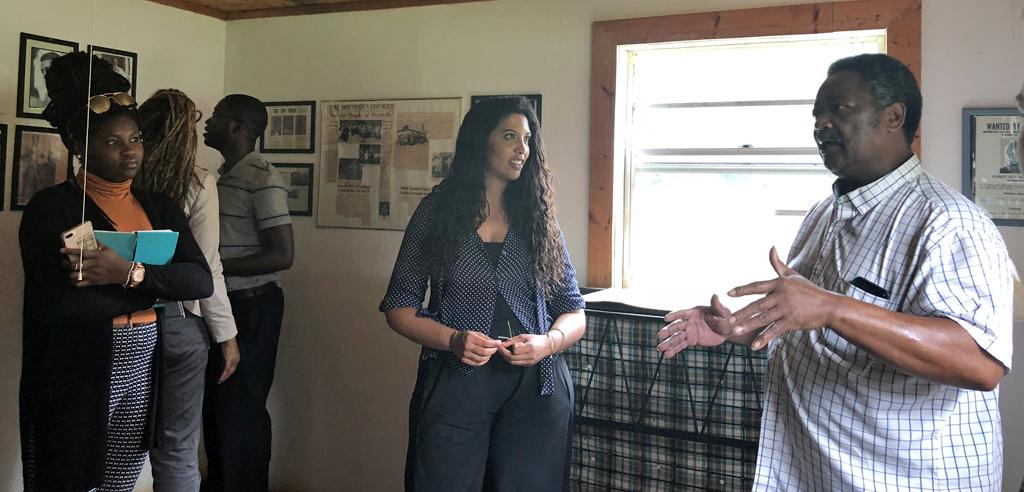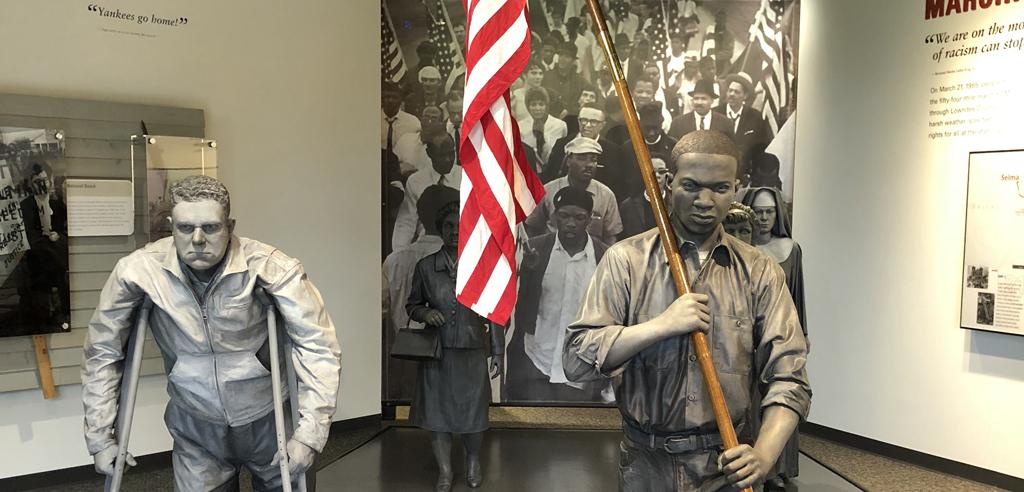On Friday, July 20, EJI’s summer interns visited Lowndes County, Alabama, to explore the rich history the region has to offer. Led by EJI Rural Development Manager Catherine Flowers, EJI interns toured the Lowndes County Interpretive Center in Hayneville, Alabama, and the original Student Nonviolent Coordinating Committee (SNCC) meeting house in White Hall, Alabama, to learn about the struggle for voting rights in America’s Black Belt.
Though African Americans made up 81 percent of Lowndes County’s population during the 1960s, no Black person could register to vote until passage of the Voting Rights Act (VRA) in 1965. Members of the local white community used threats and deadly violence to intimidate Black people who tried to exercise their political rights in the decades before the VRA. The frequent acts of racial terror led many people to refer to the county as “Bloody Lowndes.”
“Whenever people attempt to change the status quo they receive threats,” said Catherine Flowers, a native of Lowndes County, while leading the tour. “It still happens to this day.”
Despite the odds against them, African Americans in Lowndes County continued to organize and protest for their rights in the face of serious danger. They eventually attracted support from Dr. Martin Luther King Jr. and organizations like the Southern Christian Leadership Conference (SCLC) and SNCC.
Founded at Shaw University in 1961, SNCC played a vital role in achieving voting rights for African Americans, and in 1963, SNCC activists made their way to communities in Alabama to begin registering Black voters. The civil rights organization galvanized a new generation of activists and used grassroots methods to empower local communities.
During their tour, EJI interns met John Jackson, who served as the first Black mayor of White Hall, Alabama, from 1978 to 2009. Mr. Jackson is a grey haired man with a youthful spirit. He led the interns through the original SNCC meeting house that his parents owned during the 1960s, a place they bravely allowed SNCC organizers to use to hold meetings with local residents. The meeting house is small, wooden, white, and elevated with cement bricks. The interior walls are covered with news articles and pictures of community organizers such as Stokely Carmichael. Mr. Jackson took this opportunity to speak to the group about grassroots organizing in the wake of white terror.
“They didn’t want us to know how to get things done because they were afraid,” said Mr. Jackson. “And we decided we weren’t going to take it anymore.”

Former White Hall, Alabama, Mayor John Jackson speaks with EJI interns Hafzat Akanni and Makaiya Bullitt-Rigsbee in the Lowndes County home his parents permitted organizers working with the Student Nonviolent Coordinating Committee to use for meetings and community education in the 1960s.
Civil rights activism fighting segregation and demanding equal voting rights spread throughout the 1960s. Lowndes County and the surrounding Alabama Black Belt became a major battlefield as organizers like SNCC focused on the area as a place to expose injustice and mobilize a grassroots movement. After law enforcement brutally attacked voting rights protesters trying to march across Selma’s Edmund Pettus Bridge on Bloody Sunday (February 18, 1965) photographs and video footage of the violence made national news. Soon, people from all over the country heeded Dr. King’s call to come to Selma and join the march. On March 21, 1965, the march set out from Selma, headed for the state capital on a route leading through Lowndes County. On March 22 and 23, the marchers crossed Lowndes County in the rain and camped overnight at the Rosie Steele Farm in Hayneville and the Robert Gardner Farm in Burkville. The march reached Montgomery on March 26, and just four months later, in August 1965, President Lyndon B. Johnson signed the Voting Rights Act.
Finally backed by federal law, organizers led by Stokely Carmichael and SNCC began intensive voter registration efforts in Lowndes County, including registration drives, political education classes for local Black residents, and the launch of the Lowndes County Freedom Organization (LCFO), a local independent Black political party that sought to build political power by registering African Americans to vote.
“When we don’t vote, they win,” said Catherine Flowers. “It’s local, you can’t just look at the presidential election.”
The LCFO adopted the Black Panther as a visual contrast to the regression of the Democratic Party, and faced significant backlash. White business owners refused to serve known LCFO members in their stores and restaurants, and Black tenant farmers were evicted from their homes. Many African Americans were left homeless and unemployed, and SNCC organizers and local leaders worked to purchase tents, cots, heaters, food, and water to establish a “tent city” where these families could find shelter and resources.
At the Lowndes County Interpretive Center, the interns encountered an exhibit created to resemble the living quarters in a tent city. A poster above a cot described the eviction of Black sharecroppers and included a quote from Josephine Mays, a 1966 tent city resident: “Now we could make a start for ourselves.”
In 1966, several LFCO candidates lost election campaigns, but the LCFO helped lay the foundation for organizations such as the Black Panther Party for Self-Defense (BPP), which was established by Huey P. Newton and Bobby Seale in Oakland, California. Inspired by the LFCO Black panther logo, the BPP became one of the era’s most radical organizations promoting the ideal of “Black Power.”
In the decades that followed, the VRA’s legal protections and enforcement mechanisms helped bring about a tremendous increase in African American registration rates, voter turnout, and office holders. Nearly 50 years after the law’s passage, in 2013, the United States Supreme Court severely weakened the VRA by freeing states with histories of voter discrimination, such as Alabama, Texas, and North Carolina, from federal oversight.
Standing in the midst of historical struggle, both Catherine Flowers and John Jackson urged the interns to pick up the torch to continue fighting for justice.
“We need you now,” said Mr. Jackson. “The work is just beginning.”
